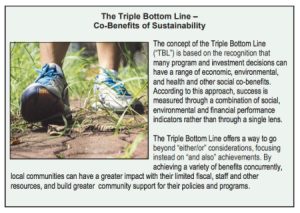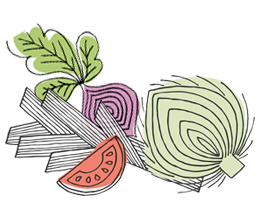
Local Climate Strategies
Solutions Near & Far
Food Choices Matter Too!
Learn More
Overcoming Obstacles – Myth of negative economic impacts, Food Inequities, and Bad Policies
Some folks might think that transitioning to sustainability will have negative economic impact, i.e. it costs too much to make changes. But, in fact, new businesses and jobs are being created all the time as people find creative ways of building sustainability.
Here is a website showcasing a business that started in Chicago and meets a critical need in the efforts to reduce food waste.–https://www.wastenotcompost.com/.
Companies will be asked to speak to their carbon footprint and the climate justice issues that are impacted by company activity.
Externalities are costs or benefits that impact a third party, not necessarily the parties to a specific transaction. When we ignore the environmental impact of our transactions, then our collective choices of inaction when it comes to climate change is resulting in catastrophic costly damages from flooding and fires, and extended periods of heat or freezing.
See below the idea of the Triple Bottom Line. Showing a profit should no longer be enough for a company to be supported.

And this other article shows how focusing on food waste improves existing operations at IKEA. Per the World Resources Institute, the results showed that for every $1 invested in reducing food waste, $7 dollars were saved in operating costs.–http://www.wrap.org.uk/blog/2019/02/new-report-serves-savings-restaurants-reducing-food-waste
Food inequity is a byproduct of our traditional distribution of food – too much in affluent areas, and not enough in poorer ones.
This link is about a non-profit that is bringing people together to address imbalances in our current distribution system. It is an example of the creative, inclusive solutions that will bring about the paradigm shift that we need to achieve sustainability.–https://www.shareable.net/how-one-nonprofit-is-fighting-hunger-food-waste-and-poverty-with-kitchen-apprenticeships/
Because food is essential to our collective survival, many polices have been created over time regarding food safety, access to food, farm subsidies, farm loans, setting milk prices, restaurant workers’ wages, farm workers’ wages and many other areas related to food. Here is an article from a regional food network similar to SOFS that details how the social inequity in this country has impacted our food system, and asks some good questions about what policies we need to change. https://nwtnlfn.org/2021/02/08/resetting-the-table-solving-inequality-and-racism-through-food/. It’s important to understand the policies affecting our food system and to advocate for policies that will solve its underlying deficiencies.
One of the most effective methods of learning something is through the use of humor. For your enjoyment, here is a link to the very funny John Oliver on the issue of food. https://www.youtube.com/watch?v=i8xwLWb0lLY

